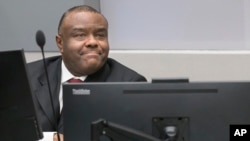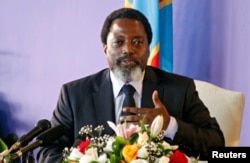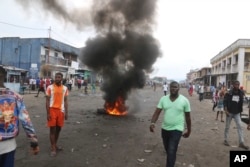The re-emergence of a former rebel leader convicted of war crimes could make the Democratic Republic of the Congo’s upcoming presidential election even more volatile.
Jean-Pierre Bemba will return to Congo in August and plans to run for president in the country’s December polls, said Eve Bazaiba, the secretary general of the Movement for the Liberation of Congo.
Bemba could galvanize a base of supporters eager to see incumbent President Joseph Kabila dislodged from power. But observers worry about the possibility of violence in a country already on edge.
Flouting term limits
In 2001, when he was just 29 years old, Kabila rose to power days after his father, Laurent, the sitting president, was assassinated.
He won elections in 2006 and 2011, reaching the end of his second, and final, term in 2016. But elections for a successor were delayed in a move that drew widespread condemnation.
Now, with the country set to vote at the end of the year, the international community has grown increasingly concerned that Kabila will seek a third term, in violation of the constitution, or cause further delays.
“Kabila is, for sure, trying to run in these elections. This is his ‘Plan A,’” Adeline Van Houtte, a research analyst at the Economist Intelligence Unit, told VOA.
One way Kabila could try to stay in power, Van Houtte said, is by exploiting a loophole in the constitution, which the country changed in 2011. That amendment reduced the number of rounds of voting for presidential candidates from two to one, a change that Kabila might argue resets the number of terms he’s been in office.
If that doesn’t work, Van Houtte said, Kabila might hand-pick a successor and retain power in an informal role.
Warlord-turned-politician
After leading rebel forces in Congo’s civil war, Bemba became one of four vice presidents serving under Kabila in 2003.
He ran against Kabila for the presidency three years later, securing 42 percent of the vote to Kabila’s 58 percent in a hotly contested runoff election.
Bemba’s political aspirations soon dwindled.
In 2008, he was arrested and later charged with war crimes and crimes against humanity. The charges stemmed from actions that troops under Bemba’s command took in the Central African Republic in 2002. His trial began in 2010 and became one of the International Criminal Court’s most high-profile cases, with a guilty verdict coming six years later.
But last month, Bemba’s convictions were overturned, on appeal, by the ICC, paving the way for his return to the DRC.
‘Dangerous’ connections
Despite the accusations of human rights violations and the time he spent outside the country, Bemba still has a large base of support, especially in the north and west of the DRC.
His return could bring instability to an already contentious process because he has the capacity to start a movement, Van Houtte said.
Congolese voters might otherwise accept another delay or a hand-picked successor, but Bemba could force a reckoning, if Kabila refuses to relinquish control, or if questions about the credibility of the election gain traction.
“[Bemba] has the ability to find support at the grassroots level, and he has connections in former rebel networks. So that could easily become dangerous,” Van Houtte said.
Bemba could also help Kabila by dividing the opposition.
“It risks complicating the opposition’s effort to unite behind a single presidential candidate,” Van Houtte said. “Bemba announced that he would like, at least, to have a single candidate for the opposition, but that doesn’t mean that they will agree on this.”
It’s also not clear how strong the field of opposition candidates will be.
One potential challenger, Moïse Katumbi, a wealthy businessman and the former governor of Katanga Province, has faced intimidation since declaring his candidacy in March. He was forced into exile in Belgium in June and is being tried by Congo’s Supreme Court on charges of “harming domestic security.”
So far, he’s attempted to campaign remotely via the internet.
Unknown intentions
Congo has been besieged with war and violence during Kabila’s tenure, and international pressure continues to mount for the country to respect the term limits enshrined in its constitution.
Key officials were sanctioned ahead of the planned 2016 election due to concerns they had used violence and intimidation to delay the vote.
And Thursday, in a meeting with the United Nations Security Council, U.S. Deputy U.N. Ambassador Jonathan Cohen expressed the United States’ regret that Kabila has not yet confirmed that he won’t run for a third term.
Kabila has made no official announcement of his intentions, but recent moves suggest he’s getting ready for a fight.
In May, he appointed three high court judges likely to be sympathetic to his interpretation of the constitution.
Earlier this month, he reshuffled the army, giving high-level promotions to several generals under international sanctions for violent crackdowns on civilians.
Candidates have until August 8 to register their campaigns.






